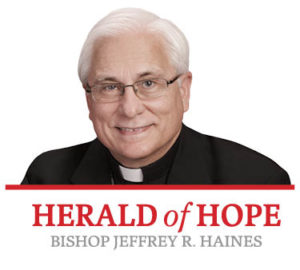Herald of Hope
There seems to be a common theme running through most of the conversations I hear these days about the coming celebration of Christmas. The consensus of most is that – because of the influence of the COVID-19 pandemic and its accompanying consequences – things are not going to be the same this year. There is the sense that some of the most cherished traditions of Christmas will be missing or greatly reduced.
I have heard many people speak about limitations on the size of their annual gathering of family, relatives, neighbors and friends due to dire warnings of “super-spreader” events. Some even mention the cancellation of these cherished reunions altogether. I have heard as well that the severe downturn of the economy will impact the size and number of gifts that will be presented, limiting the enthusiasm and expectation of the colorful packages that normally would be sitting beneath the Christmas tree. I also have heard that a number of homes won’t even feature such a festive tree, as some have pointed out that there is no need to put up holiday décor if guests will not be coming over to visit. Even the time-honored practice of the trip to the shopping mall to sit upon the lap of Santa Claus and whisper one’s wishes into his ear has been impacted, as the limitation of social-distancing has caused such encounters to take place virtually via computer or through the barrier of a plexiglass shield. And, the most poignant melancholy has come from many of the elderly, frail in health and those with pre-existing conditions who lament that such elements will prevent them from attending the glorious celebration of Christmas Mass.
While one could comment that these Christmas traditions are merely customs, their limitation or absence leave a profound sadness. These traditions represent and capture the most prized values of faith, harmony, fellowship, charity, wonder and joy that are the essence of Christmas. So, it truly is accurate to suggest that Christmas really won’t be the same this year. Some things very special will be missing.
And, yet, it is precisely the deprivation of these special elements of Christmas which lead me to suggest that their lack of availability could well provide us with one of the most authentic experiences of the Season of Advent we have ever known. I base this claim on the belief that one of the elements that is central to Advent is a feeling of longing. At its core, Advent is an ache in the heart. It is a sense of emptiness, which is not being fulfilled. It is an acknowledgment that something vital is missing, and we cannot and will not find it without the help of God. It is a realization that we need a Savior.
No one knows more about the feeling of Advent than our ancestors in the faith, who so desperately looked for the promise of the Lord to send someone to rescue them and set them free. Our ancestors in the faith were imprisoned by deprivation. The oppression of imperial rule over the Promised Land made a mockery of freedom. Imposing monarchs sought to strip them of their identity and impose upon them a foreign culture. Taxation sentenced them to subsistence living or extreme poverty. And, worst of all, for many, obedience to the Law and faithfulness to the Covenant had been compromised. Those who still did believe cried out their longing to the Lord from the deepest depths of their hearts, praying, “O God, you are my God – for you I long! For you my body yearns; for you my soul thirsts, Like a land parched, lifeless, and without water. So I look to you in the sanctuary to see your power and glory. For your love is better than life; my lips offer you worship!” (Psalm 63:1-4) and “My soul longs for your salvation; I put my hope in your word. My eyes long to see your promise. When will you comfort me? … My eyes long to see your salvation and the justice of your promise. Act with kindness to your servant.” (Psalm 119:81-82, 123-124).
The temptation, of course, would be to ignore such longing and the discomfort and sorrow it brings. Noted spiritual author Fr. Ronald Rolheiser O.M.I., however, counsels against denying, repressing or denigrating the longing of our hearts. Rather, he challenges us to enter into it. He recommends that we embrace it. This is because befriending our longing opens us up to something more, something greater than ourselves. Longing is a humble recognition of insufficiency, which propels us beyond ourselves to God. To enter into our longing frees us from attachment to what the earth can provide to ache for what only can be found in the Kingdom of God – things like consummation, oneness, completeness, peace and justice.
“In longing are the seeds of hope,” Fr. Rolheiser proclaims. It opens our hearts to the Holy Spirit, who can plant hopes and dreams well beyond our imagining. Yes, in hearts dejected by the limitation of the Christmas traditions like family gatherings, gifts, decorations and Santa Claus, the Holy Spirit can sow the possibility of encountering not just what these traditions stand for – but the essence of Christmas itself, our Savior Jesus Christ born anew.

